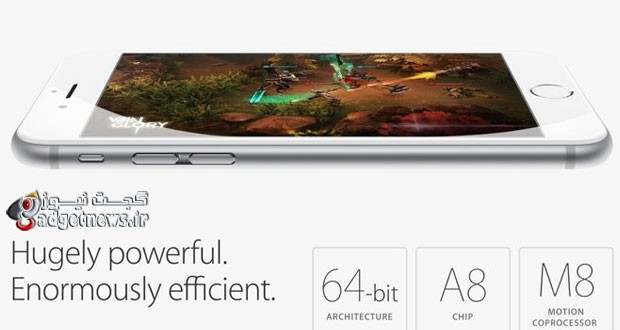اپل از آیفون 5 تاکنون از رمی یک گیگابایتی برای گوشیهای هوشمند خود استفاده کرده است. اپل نخستین بار در نسل سوم آیپدهایش از رمی یک گیگابایتی بهره برد و آیفون 6 سال گذشته نیز بالاخره توانست این رم را در اختیار بگیرد.بر اساس گفتههای وبسایت معتبر «اپل اینسایدر» (Apple Insider)، نسل بعدی گوشیهای آیفون که احتمالا با نامهای آیفون 6اس و آیفون 6اس پلاس معرفی خواهند شد، دارای دو گیگابایت رم خواهند بود.
حافظه اضافی اگرچه باعث افزایش قابلیتهای مالتی تسکینگ میشود، اما از سویی افزایش مصرف باتری را هم به دنبال خواهد داشت. بنابراین ممکن است در نسل بعدی آیفون، شاهد حضور یک باتری بزرگتر باشیم.
آیپد ایر 2 نیز که سال گذشته معرفی شد، دارای دو گیگابایت رم است و انتظار میرود که اپل بار دیگر سیاست گذشته خود را تکرار و این حافظه را به آیفون بعدی نیز بیاورد.
انتقادات از اپل به واسطه استفاده از حافظههای کم رم سابقه ای طولانی دارد که پس از عرضه آیفون 6 یک گیگابایتی به تمسخر این کمپانی نیز کشیده شد. منتقدین میگویند در شرایطی که پرچمداران اندرویدی صاحب حداقل رمهای 2 گیگابایتی و حداکثر 3 گیگابایتی هستند، اپل نیز باید این سیاست را در پیش گیرد.اما اساسا سیستم عامل کنونی iOS چندان نیازی به رمهای بالا ندارد و با حافظه در حد یک گیگابایت نیز دستورات و اعمال مدنظر کاربر را انجام میدهد. با این حال تستهای فنی نشان میدهد که سیستم عامل اندروید به حافظههای بالاتر از دو گیگابایت برای اجرای روان تمامی دستورالعملها نیاز دارد.
افزایش رم از یک گیگابایت به دو گیگابایت در آیفون بعدی میتواند نشانهای از تمایل اپل به ارتقای کیفیت قابلیتهای مالتی تسکینگ iOS نیز باشد.
منبع : appleinsider
'iPhone 6s' said to ship with 2GB of RAM, Apple leaning toward including Apple SIM
'iPhone 6s' said to ship with 2GB of RAM, Apple leaning toward including Apple SIM
Apple’s 2015 iPhone update will purportedly add some features introduced in the iPad Air 2 last year, including an upgrade to 2 gigabytes of RAM and the possibility of pre-installing the Apple SIM, giving users the ability to select a carrier on their own out of the box. A person familiar with Apple’s future product plans, who has provided reliable information in the past, indicated to AppleInsider that the so-called “iPhone 6s,” and presumably the Plus version as well, will in fact be upgraded to 2 gigabytes of RAM. Apple has used a single gigabyte of RAM in its iPhone lineup dating back to the iPhone 5, which launched in 2012.
It was earlier that same year that Apple introduced one gigabyte of RAM in its custom A-series CPUs with the third-generation iPad with Retina display. It’s expected that Apple will follow the same approach again, bringing iPad memory upgrades to the next iPhone, since the iPad Air 2 included 2 gigabytes of RAM embedded in its A8X chip last year.
Additional RAM would allow iOS to leave background tasks and tabs in Safari open for longer without a need to reload or refresh. But additional RAM can also come with costs to battery life, as memory constantly consumes power.
The same source also told AppleInsider that Apple is strongly considering shipping its next-generation handset with the Apple SIM pre-installed. That piece, which also made its debut with the iPad Air 2, allows consumers to sign up for mobile data plans from any participating carrier directly from the Settings app without long-term contracts and to switch providers at any time.
Such a move would likely meet staunch resistance from wireless carriers, who have forced Apple to scrap similar plans in the past. Even those carriers that signed on to support the Apple SIM in the iPad Air 2 placed limitations on its usefulness when not purchased directly from Apple, and leading U.S. carrier Verizon abstained entirely.
Competition among carriers has been increasingly fierce in recent years, as the airwaves become relatively commoditized and consumers less brand-loyal. Presumably, carriers will be reticent to cede a direct sales relationship with customers, perhaps more so than they were when Apple first floated its virtual SIM idea in 2010.”The operators are accusing Apple of trying to gain control of their relationship with their mobile customers with the new SIM,” the Financial Times reported then. That opinion is not likely to have changed.
What has changed is Apple’s position in the market. The iPhone is now the most popular consumer product since the microwave, making it impossible for carriers to ignore.
If Apple does decide to ship the Apple SIM in the new iPhone, carriers are unlikely to eschew support completely — as Verizon has done until now. Rather, the balance of probability tilts in favor of AT&T-style “dedication,” in which handsets purchased from carriers would be locked to that network, but those purchased unlocked directly from Apple would be free to pick-and-choose plans at will.
If Apple follows its usual annual release schedule, the next-generation iPhone models should be announced in September, and will be released to the public soon after. It’s expected that the new devices will focus on under-the-hood changes, as Apple’s “S” upgrades tend to leave the exterior of the handset largely unchanged from its predecessor.
 گجت نیوز آخرین اخبار تکنولوژی، علم و خودرو
گجت نیوز آخرین اخبار تکنولوژی، علم و خودرو 






